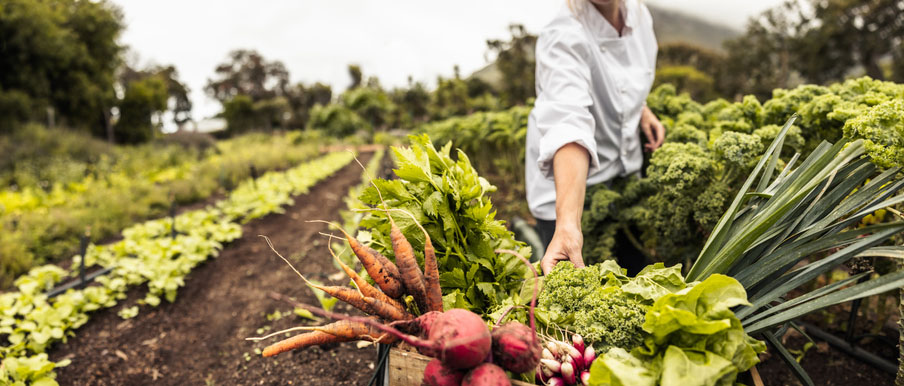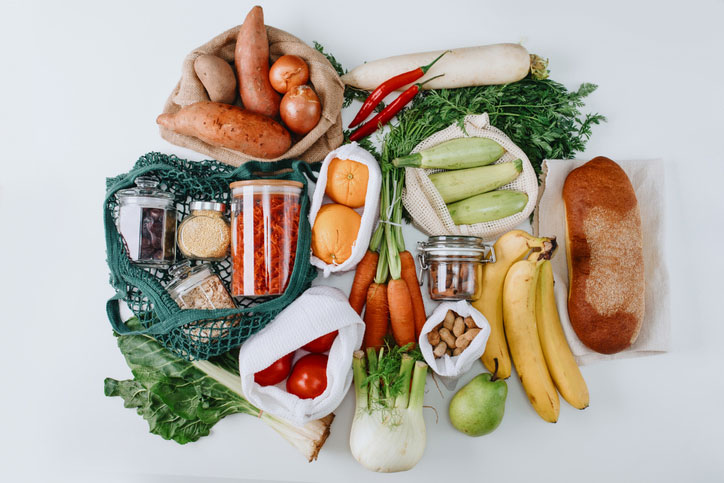Sustainable nutrition is an approach to eating that utilizes Earth’s resources without depletion while meeting nutritional needs. It focuses on plant-based proteins, reducing food waste, and lowering carbon footprint while considering health, environmental impact, economic access, and cultural context to promote global food equity.
In response to growing concerns about climate change alongside widespread dietary concerns, a new effort has arisen to address these dovetailing issues. What was once a local-level grassroots cause has evolved into a global movement known as sustainable nutrition, a system designed to improve not only our health but also our planet.
Table of Contents
What Is Sustainable Nutrition?
Sustainable nutrition is an approach to eating that aims to utilize the world’s resources without depleting them or causing other kinds of environmental damage. It’s designed to combat the tremendous harm that many methods of food production have caused the planet, ensuring that future generations will continue to have access to natural sources of nutrition.

In thinking about sustainability, there are four main factors that proponents of sustainable nutrition consider:
- Individual health and nutrition – Meeting personal nutritional needs for optimal health
- Environmental concerns – Minimizing ecological damage and carbon footprint
- Economic dynamics – Ensuring affordable access to nutritious food
- Socio-cultural context – Respecting food traditions and cultural practices
You can see that beyond personal nutrition and eco-friendly production practices, the sustainable nutrition movement is also focused on issues of equity and access. The goal is to reshape our global approach to food so that everyone can eat a healthy and sustainable diet.
For those interested in making sustainable nutrition a career focus, becoming a registered dietitian with a specialization in environmental nutrition offers opportunities to guide individuals, communities, and organizations toward more sustainable food systems.
The following bachelor’s and master’s programs offer career-focused instruction delivered by trained nutritionists with experience in the field. Discover more about what each course of study has to offer through the locations listed below.
The following bachelors and Master’s programs offer career-focused instruction delivered by trained nutritionists with experience in the field. Find out more what each individual course of study offers through the locations below.
Purdue Global's Bachelor of Science in Nutrition Program is an approved holistic nutrition education program through the National Association of Nutrition Professionals (NANP).
Arizona State University - Online offers an Online Masters in Medical Nutrition
The University of Texas at Austin offers an Online Master of Science in Nutritional Sciences.
Grand Canyon University offers an M.S. in Nutrition and Dietetics.
UNC's MPH Nutrition concentration prepares students to provide, evaluate and communicate nutritional and dietary guidance that improves individual and population-wide health outcomes. In addition to developing their knowledge of nutrition science, students will explore behavior change, communication, counseling and the effects of dietary culture on individuals and communities.
Walden University's Bachelor of Science (B.S.) in Health Studies - Health Promotion and Wellness gains job-ready, immediately applicable skills today's employers want.
Personal Health and Nutrition
In conceiving of a sustainable food system, one of the fundamental guiding principles must be health and nutrition. Around the world, high rates of obesity as well as malnutrition can be found, along with life-threatening conditions caused by unhealthy diets.
The World Health Organization reported that in 2022, over 2.5 billion adults were overweight, with 890 million living with obesity, while 462 million adults were experiencing undernutrition. Designing sustainable eating habits for the planet involves assessing the needs of diverse demographics and implementing initiatives that cater to their specific dietary requirements.
Overconsumption and Addiction to Sugar and Salt
The US Department of Health and Human Services reports that two out of every five adults and one out of every five children have obesity, a condition that’s caused by overconsumption and a high-calorie diet. Obesity has been linked to a wide variety of serious diseases and conditions, including type 2 diabetes, heart disease, strokes, and cancer.
Some demographics are more likely to have obesity and are at greater risk of developing these conditions. Many of these diseases can also be caused by an unhealthy diet, even for those not struggling with obesity. Those who consume too much sugar, especially children, are at risk of cardiovascular disease and diabetes. In developing sustainable nutrition practices, it’s imperative to design new diets that lower overall sodium and sugar intake and provide more nutritious options to populations with high rates of obesity.
High-Quality Proteins
Protein is a vital component of any balanced diet. For children, a proper intake of protein is necessary for healthy growth. For adults, it’s a primary source of energy. Consuming adequate protein can also help people maintain a healthy weight.
The US Department of Health recommends that each person consume 0.8 grams of protein for every kilogram of body weight. For a person weighing 165 pounds, this would mean consuming approximately 60 grams of protein per day. Making a protein-rich diet available in the long term is an essential factor for those focused on sustainability and nutrition.
High-Quality Sustainable Proteins:
| Protein Source | Protein per 100g | Sustainability Benefits |
|---|---|---|
| Lentils | 9g (cooked) | Low water usage, nitrogen-fixing, reduces the need for fertilizers |
| Beans | 8-9g (cooked) | Minimal carbon footprint, improves soil health |
| Tofu | 8g | Lower emissions than meat, efficient land use |
| Eggs | 13g | Lower carbon footprint than most meats, complete protein |
| Seaweed | 6g (dried) | No land or freshwater needed, absorbs CO2 |
| Soy Products | 12-16g | High yield per acre, nitrogen-fixing properties |
You may notice that no meat is listed among these ingredients, and that eggs are the only animal products. It’s often recommended to adopt a plant-based diet when seeking to establish sustainable eating habits. Those interested in specializing in plant-based nutrition can explore becoming a vegan dietitian to help clients make this transition effectively.
Implementing Fiber
Fiber is an essential part of a healthy diet, providing a range of benefits to the body, including aiding in critical digestive processes, lowering cholesterol levels, and even helping to prevent certain forms of cancer. Despite its numerous health benefits, many Americans struggle to meet the recommended daily fiber intake.
Harvard’s School of Public Health reports that while the average adult needs between 25 and 35 grams of fiber per day, most adults consume only around 15 grams per day. This demonstrates that considering sustainability and nutrition is also an opportunity to enhance our existing nutrient intake, specifically by designing diets that contain more fiber for the majority of people.

Sustainable High-Fiber Foods:
- Oatmeal – 4g fiber per cup (cooked)
- Nuts – 3-4g fiber per ounce
- Lentils – 8g fiber per cup (cooked)
- Flax seeds – 3g fiber per tablespoon
- Quinoa – 5g fiber per cup (cooked)
- Brown rice – 4g fiber per cup (cooked)
- Kale – 2.5g fiber per cup (cooked)
If these are already part of your diet, it’s time to take the next step to ensure that your sourcing meets the highest standard of sustainable nutrition. Learning about the farming practices behind your produce is the best way to determine if your go-to ingredients are making a positive or negative impact on the planet.
Age-Based Nutrition
Nutritional needs vary significantly by age, body type, genetics, and life events, such as pregnancy. One of the significant challenges in developing a comprehensive plan for sustainable nutrition is that a robust system must be able to meet the diverse range of nutritional needs faced by people in vastly different demographics and life stages.
For information on official recommendations for nutritional intake by age type and stage of life, take a look at the USDA Department of Agriculture’s nutrition life stage index.
Chemicals and Preservatives
Chemicals and artificial preservatives constitute a significant part of large-scale agricultural practices, though they’re known to be harmful to our health. Some pesticides have been found to harm the nervous system and eyes, while others have been linked to carcinogenic effects. Although chemicals used in farming are under scrutiny, they’re still widely used.

In addition to being harmful to our health, the use of chemicals and preservatives is unsustainable for the environment. Many of these agents can ultimately cause long-term damage to the land, making it unfarmable and disrupting local ecosystems.
Environmental Considerations
Many of the environmental benefits of a sustainable approach to food are outlined in the health benefits listed above. But there are even more ways that thinking about sustainability and nutrition go hand in hand to protect the planet. In some cases, these areas of concern address factors outside of food itself, but related to food, such as production methods and waste.
Food Waste
In addition to solving the issue of human food consumption, it’s equally important to address the issue of human food waste. This is likely to vary by community, as waste management systems differ significantly from one place to another. What’s imperative is that the issue of food waste be considered alongside dietary concerns, as the two are intimately connected.
According to the USDA, approximately 30-40% of the food supply in the United States is wasted. Reducing food waste at the consumer level is a crucial component of sustainable nutrition, requiring both education and practical strategies.
The Move to Plant-Based Nutrition
Many of the solutions to our resource and health crises point to a shift toward plant-based nutrition. The sustainable forms of protein listed earlier in this article are all plant-based and have been proven to offer significant health benefits without the harmful environmental impact associated with meat.
That being said, many who are involved in the conversation about sustainability and nutrition argue that there’s still a place in our ecosystem for the livestock sector, albeit on a significantly reduced scale compared to our current large-scale farming practices. Still, unless you’re getting fresh meat from a local farm, if you’re looking to cultivate sustainable eating habits, you’re likely to rely upon plant-based nutrition.
Reducing Carbon Footprint
One of the most significant areas where the issues of sustainability and nutrition intersect is in the carbon footprint of the agricultural industry. Animal farming, in particular, has been found to have disastrously harmful effects on the environment, accounting for 65% of the world’s nitrous oxide emissions annually.
Farming has been a primary source of food for humans for millennia, and numerous farming practices exist that not only avoid harming the land but also actively improve it. The question is how to draw from those practices and adapt them to suit the contemporary needs of our planet.
While it will take considerable advocacy and grassroots-led pressure to change how these systems impact our ecosystem on the broadest scale, you can play your part by developing sustainable eating habits that reduce your carbon footprint. This is where plant-based nutrition often provides the solution. On average, vegans and vegetarians have a significantly lower carbon footprint than meat-eaters.
| Food Type | CO2 Emissions (kg per kg of food) | Water Usage (liters per kg) |
|---|---|---|
| Beef | 60 kg | 15,415 liters |
| Lamb | 24 kg | 10,412 liters |
| Pork | 7 kg | 5,988 liters |
| Chicken | 6 kg | 4,325 liters |
| Eggs | 4.8 kg | 3,265 liters |
| Lentils | 0.9 kg | 5,874 liters |
| Tofu | 2 kg | 2,157 liters |
| Vegetables | 2 kg | 322 liters |
Sustainable Shopping and Home Items
When considering the environmental impact of food, it’s essential to reflect on the other food-related items we use daily. Though compostable and recyclable straws are becoming more common, single-use plastic remains a massive source of non-degradable waste.

To reduce waste, invest in reusable products from food containers to shopping bags so that your food habits won’t continue to produce non-degradable waste. Be sure to select items that are as convenient to use as their single-use plastic counterparts so that you actually incorporate them into your routines.
Economic Considerations
Beyond just discussing its relationship to health and the environment, the conversation around sustainability and nutrition emphasizes that this movement is also related to economic questions.
Food Deserts
As it stands, we’re all significantly economically impacted by our existing food systems, as the price of food is a significant determining factor in our lives. When a community lacks access to affordable, nutritious food, it is referred to as a food desert. This can be because of low average incomes in the community, a lack of transportation to the nearest healthy grocery store, or a combination of the two.
These communities often experience high rates of obesity and health issues related to a poor diet, as individuals only have access to unhealthy foods. To develop genuinely sustainable nutrition practices means opening up access to healthy food for all people, both by making healthy food more affordable and creating locations where nutritious food can be purchased in communities that lack them.
Public health nutritionists play a crucial role in addressing food deserts by collaborating with communities, policymakers, and organizations to enhance access to nutritious foods and implement effective nutrition education programs.
Malnutrition
The World Health Organization defines malnutrition as undernutrition, micronutrient-related malnutrition, and diseases related to overweight and obesity. The WHO goes on to explain that “the developmental, economic, social, and medical impacts of the global burden of malnutrition are serious and lasting, for individuals and their families, for communities and for countries.”
Clearly, as crucial as the issue of nutritional intake is, the issue of access is equally significant. To put it plainly, communities that exhibit high rates of malnutrition are suffering from a lack of resources, both financial and in terms of the food available to them. New standards of sustainability and nutrition must ensure that the products of better farming practices are distributed more equitably to prevent the malnutrition crisis that has arisen in societies worldwide.
Creating Sustainable Eating Habits
If learning about sustainability and nutrition inspires you to revise your eating habits, creating a personalized plan is the next step. A comprehensive nutrition plan that incorporates sustainable principles can help you meet your health goals while reducing your environmental impact.
Practical Steps to Get Started
- Start with plant-based meals – Try incorporating one or two meatless days per week.
- Buy local and seasonal – Support farmers’ markets and reduce transportation emissions.s
- Plan your meals – Reduce food waste by planning weekly menus and shopping lists.
- Grow your own – Even a small herb garden can reduce packaging waste
- Compost food scraps – Turn organic waste into nutrient-rich soil
- Choose whole foods – Minimize processed foods, which often have higher carbon footprints
- Read labels – Look for certifications like organic, fair trade, and sustainably sourced
Working with a Nutrition Professional
If you’re motivated by learning about the many different dimensions of how food impacts both our health and the planet, you may be inspired to pursue a career in nutrition. The rise in interest in sustainability and nutrition has led to numerous exciting new job opportunities for nutritionists who can help individuals develop sustainable eating habits.
Registered dietitians with a focus on sustainable nutrition can provide personalized guidance that balances your health needs with environmental considerations. They can help you navigate the complexities of sustainable eating, ensure you’re meeting all your nutritional requirements, and develop realistic, long-term habits that work for your lifestyle.
Frequently Asked Questions
What is sustainable nutrition?
Sustainable nutrition is an approach to eating that meets current nutritional needs without compromising the ability of future generations to meet their needs. It considers health, environmental impact, economic accessibility, and cultural context, typically emphasizing plant-based foods, reducing food waste, and making choices with a lower carbon footprint.
How can I start eating more sustainably?
Start by incorporating more plant-based meals into your diet, buying local and seasonal produce, reducing food waste through meal planning, choosing whole foods over processed options, and supporting sustainable farming practices. Even small changes, such as reducing meat consumption by one or two days per week, can have a significant impact.
Is a plant-based diet necessary for sustainability?
While plant-based diets generally have a lower environmental impact, you don’t need to become fully vegetarian or vegan to eat sustainably. Reducing meat consumption, especially red meat, choosing sustainably raised animal products, and focusing on plant proteins for most meals can significantly reduce your carbon footprint while maintaining dietary flexibility.
What are the health benefits of sustainable eating?
Sustainable eating patterns that emphasize plant-based foods, whole grains, and minimally processed ingredients offer numerous health benefits, including a reduced risk of heart disease, type 2 diabetes, and certain types of cancer. These diets are typically high in fiber, vitamins, minerals, and antioxidants while being lower in saturated fats and processed sugars.
How does sustainable nutrition help the environment?
Sustainable nutrition reduces greenhouse gas emissions, conserves water and land resources, decreases pollution from agricultural chemicals, and helps preserve biodiversity. Plant-based foods generally require fewer resources to produce than animal products, and reducing food waste prevents methane emissions from landfills.
Is sustainable eating more expensive?
Not necessarily. While some organic and specialty items may be more expensive, sustainable eating can actually be budget-friendly. Plant-based proteins, such as beans, lentils, and grains, are often cheaper than meat. Buying seasonal produce, shopping at farmers’ markets, and reducing food waste can all save money while supporting sustainability.
Can I still eat meat on a sustainable diet?
Yes, sustainable nutrition doesn’t require the complete elimination of meat. Focus on reducing overall meat consumption, choosing sustainably raised options when possible, and balancing your diet with plenty of plant-based meals. Quality over quantity is key – choosing grass-fed, locally raised, or organic meats less frequently can be part of a sustainable approach.
The following bachelors and Master’s programs offer career-focused instruction delivered by trained nutritionists with experience in the field. Find out more what each individual course of study offers through the locations below.
Purdue Global's Bachelor of Science in Nutrition Program is an approved holistic nutrition education program through the National Association of Nutrition Professionals (NANP).
Arizona State University - Online offers an Online Masters in Medical Nutrition
The University of Texas at Austin offers an Online Master of Science in Nutritional Sciences.
Grand Canyon University offers an M.S. in Nutrition and Dietetics.
UNC's MPH Nutrition concentration prepares students to provide, evaluate and communicate nutritional and dietary guidance that improves individual and population-wide health outcomes. In addition to developing their knowledge of nutrition science, students will explore behavior change, communication, counseling and the effects of dietary culture on individuals and communities.
Walden University's Bachelor of Science (B.S.) in Health Studies - Health Promotion and Wellness gains job-ready, immediately applicable skills today's employers want.
Key Takeaways
- Sustainable nutrition balances four key factors: personal health, environmental impact, economic accessibility, and cultural context
- Plant-based proteins are more sustainable: Beans, lentils, tofu, and other plant proteins have significantly lower carbon footprints than animal products.
- Small changes make a difference: Reducing meat consumption, choosing local produce, and minimizing food waste all contribute to sustainability.
- It’s about more than food: Sustainable nutrition also addresses global issues like food deserts, malnutrition, and equitable access to nutritious food.d
- Professional guidance is beneficial: Registered dietitians specializing in sustainable nutrition can help you create personalized, balanced plans that meet both your health and environmental goals.
Ready to Make a Difference Through Nutrition?
Whether you want to develop sustainable eating habits for yourself or pursue a career helping others do the same, taking action starts now. Explore nutrition degree programs that emphasize sustainability, public health, and environmental nutrition to turn your passion into a rewarding career.

